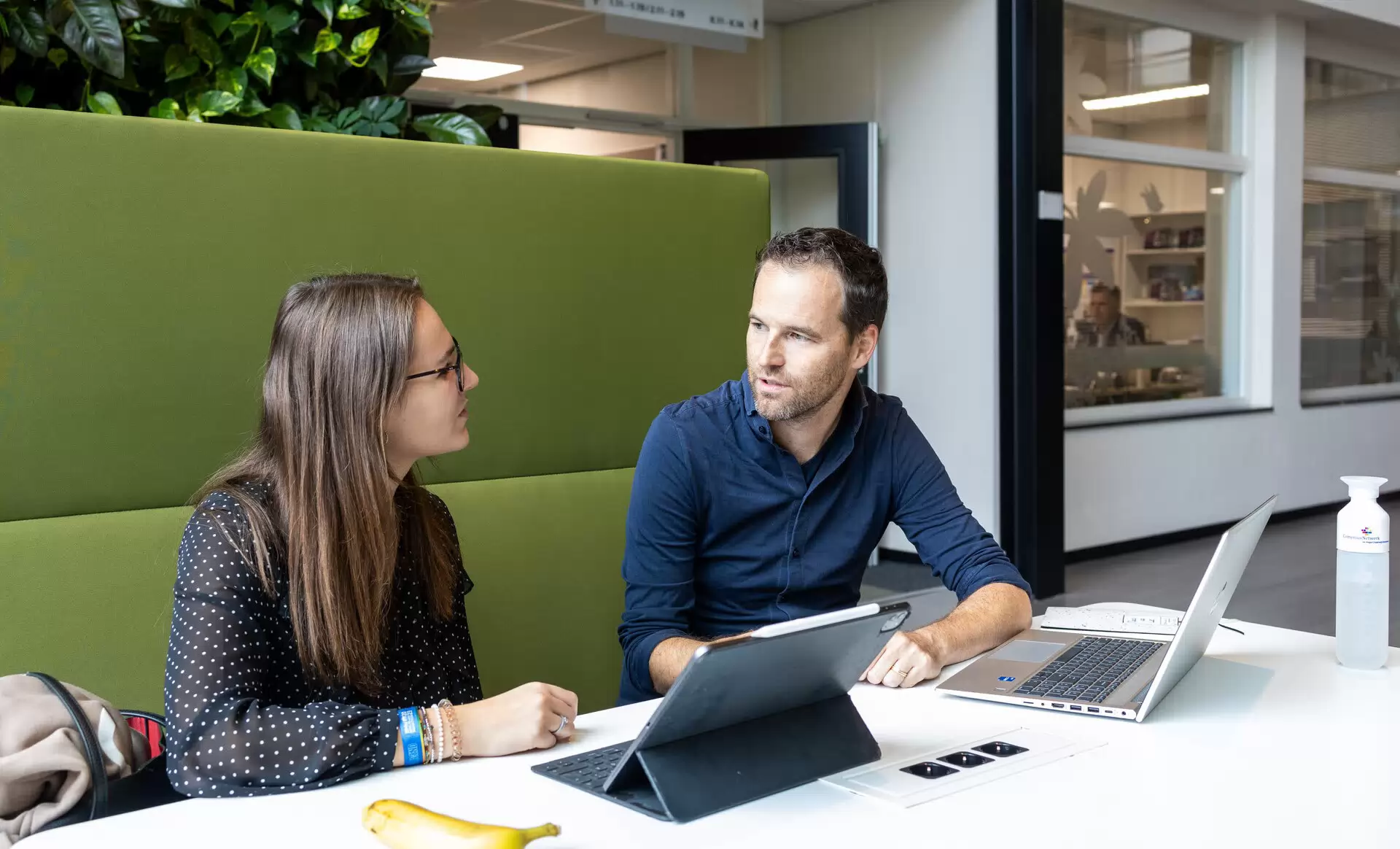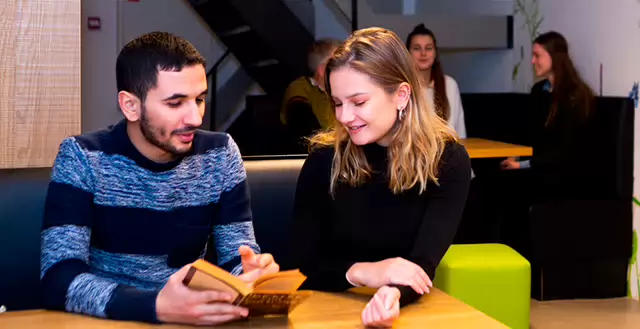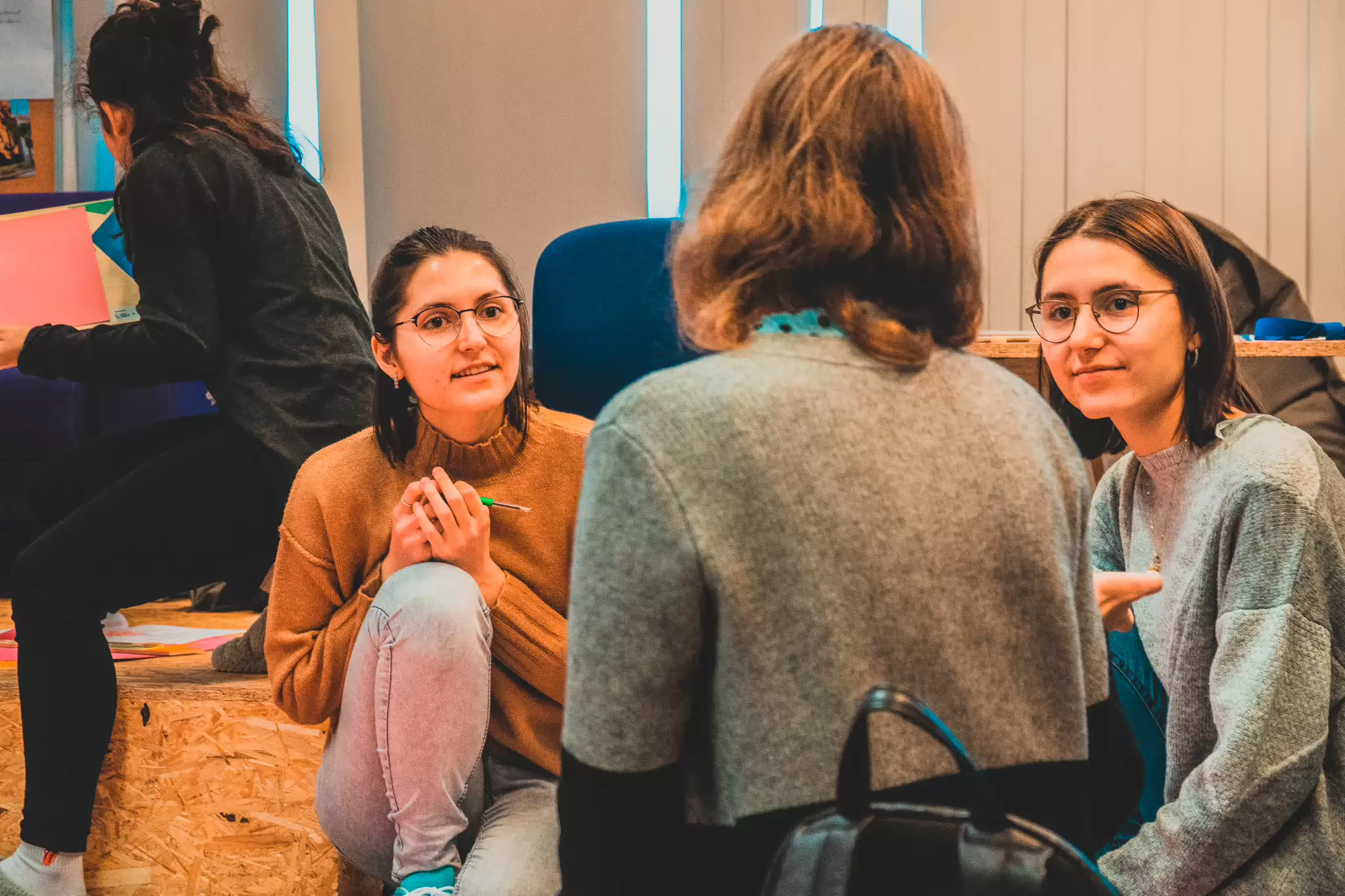
How do you help your student with study doubts?
Confidentional advisor
Also interesting;
What can I do as a student coach myself?
As a student coach, you play a crucial role in supporting students who are unsure about their choice of study. Here are some tips to guide students effectively:
1. Active involvement:
- Engage in conversation with the student, utilizing your knowledge and skills.
- Discuss study progress, learning skills, motivation and the choices made.
- Explore what exactly the student is uncertain about and whether they have already spoken to others about these doubts.
2. Signing function:
- Pay attention to signs such as passive attendance, low motivation and study progress.
- Discuss doubts with the student to prevent dropout.
Factors influencing success:
There are three factors* that influence a student's success:
- Study motivation: Do the student's qualities and interests align with the program?
- Study skills: Does the higher education level and teaching method suit the student?
- Life skills: Does the student feel at home and have a supportive network?
* Source: Covey (2019)
3. Self-reflection and concrete examples:
- Discuss doubts using concrete examples or results.
- Be proactive and provide feedback to form a clear picture of the situation.
- Conduct the conversation positively and give the student space to ask questions.
4. Increasing self-awareness:
- Help the student reflect on their situation and available choices.
- Inform them about the consequences of different options.
Next steps:
Review the cases below and learn how to act in specific situations or how to refer the student for further assistance.

Cases and how to act
Case
The student indicates that the study program does not align with their interests or strengths; they are uncertain about the level (the material is either too difficult or too easy); the study method doesn't appeal to them, such as the amount of practical work, contact hours, or the educational concept; the student has doubts whether the future field of work suits them or is considering quitting their studies.
Tips
Study-related doubts are often visible in the first period.It is important to detect and guide this student in a timely manner. Check whether the student's doubts relate to the level, motivation, field of study, or the teaching method. If the student is considering quitting and the (financial) consequences of doing so, suggest making an appointment with a student counsellor.
Direct the student to Fontys Helps!
Doubts about your study choice on Fontys HelpsReferral options
The student can follow an individual study choice trajectory or work independently on tasks to discover which study fits best.
- Individual study choice choice trajectory: The student makes an appointment with a study choice advisor.
- Gap year : A gap year is not a wasted year; discuss the possibilities with the student.
- My study choice workbook: An e-book with tools and steps to help the student choose a new study program. Direct the student to it and review the completed tasks together.
Case
The student mentions struggling with their studies and expresses that the situation at "home," "work," "in a relationship," or "within a project group" isn't helping either. They have insufficient time to study due to other obligations, such as caregiving responsibilities, which demand their loyalty.
Tips
If the student needs additional help or advice due to personal circumstances, beyond the guidance provided by the program, they can seek support from a student counsellor.
Direct the student to Fontys Helps!
Personal circumstances on Fontys HelpsReferral options
Case
The student is dealing with special circumstances that are causing study delays, such as caregiving responsibilities, autism, or being a top athlete, and expresses a need for additional support. The student may indicate these circumstances during the study choice check or registration, but not all students do so. Some students may also be looking for extra challenges alongside their studies.
Tips
It’s important to ask the student about any special circumstances that could affect their studies during your first conversation. This provides the student with the opportunity to share their situation. Explain the benefits of expressing their needs and the support they can receive. Continue the dialogue throughout their studies!
Direct the student to Fontys Helps!
Personal circumstances on Fontys HelpsReferral options
Case
The student is dealing with complaints, concerns, or personal questions that interfere with daily life, such as depression, anxiety, stress, trauma, lack of self-confidence, sleep problems, relationship issues, etc.
Tips
If the student is already receiving support from an external care provider, refer them back to that professional. If the student has not yet sought professional help, suggest making an appointment with a student psychologist. It's also helpful to know that Fontys offers various training sessions that can be beneficial.
If these issues are affecting the student's academic performance and could lead to study delays, refer them to a student counselor, who can assist with questions about things like DUO (Dutch student loans).
Keep the conversation going!
Direct the student to Fontys Helps!
Mental health on Fontys HelpsReferral options
Case
The student indicates that they lack certain skills necessary for successful study, such as reflection, teamwork, or independence. Signs may include postponing exams or assignments, withdrawing from group work or experiencing stress around exams or presentations.
Tips
During the first conversation, it’s important to ask how the student is experiencing higher education, providing them the opportunity to express their needs. Emphasize the benefits of discussing these challenges openly and maintain ongoing communication with the student.
Direct the student to Fontys Helps!
Doubts about your study choice on Fontys HelpsReferral options
Case
The student indicates they want to switch to another study program. They feel comfortable in higher professional education (HBO) and have a clear understanding of what is missing in their current program and what they believe they will find in the program they want to switch to.
Tips
If the student is unsure which program they want to switch to, first explore the reasons behind their decision to leave. Depending on these reasons, you can refer to the tips in the previous cases. If the student already knows which program they want to switch to, there may be direct transfer options within the same domain. In such cases, you can contact the switch coordinator of the relevant program.
For students who want to switch to a program outside their domain, refer them to the intake coordinator or student coach of the other program.
Direct the student to Fontys Helps!
Change of study programmeReferral options
To whom do I refer?

A student counsellor can help the student to:
- solve motivation issues;
- find a suitable solution for the obstacles that the student may experience and help them make a good choice to continue, take a break or quit their studies;
- to get extra support – depending on the cause – with requesting facilities with the exam committee or DUO;

A student psychologist can help the student with:
- complaints, concerns or issues the student does not see a direct solution for, through short-term therapy.
Depending on the complaints, concerns or issues, the student may be referred.
Share this page on Fontys Helps with your student
A study career choice advisor can help the student when:
- the student doubts whether their study programme is a good fit for them and whether it is achievable;
- the student wants to quit their current study programme and needs help with making a new study choice;
- the student does not yet know what the next step will be: gap year; studying or working;
- the student is almost graduated and has doubts about what the next step will be: working or continue studying.
The student wants to take action on their study doubts?
Direct your student to this step-by-step plan to start choosing a different study program on their own.
What fits your student?Would you like to further professionalize yourself?
Stay informed about all developments and sign up for the Student Coaching Network.
More information and sign up
